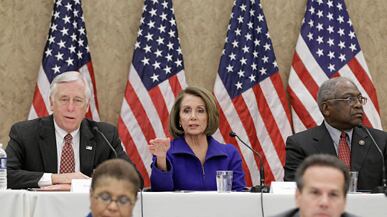One year ago, Republican Scott Brown won a stunning upset in Massachusetts’ Senate race, setting off a frantic eight-week effort by Democratic leaders to whip spooked members into a razor-thin majority for a final health-care vote. This week, as the House debates a bill that could potentially undo their hard work completely, Democrats are falling in with the party line with barely a whimper of complaint.
Minority Whip Steny Hoyer, tasked with keeping Democrats unified on votes, offered a one-word answer when asked by The Daily Beast if he expected significant defections on health care: “No.”

Indeed, only a handful of Democrats are expected to buck their party and vote to repeal health care Wednesday, based on public statements and press reports, and even a number of members who opposed President Obama’s signature achievement are criticizing the GOP’s efforts.
It’s not entirely a cause for celebration for Democrats—perhaps the biggest factor behind the party’s newfound unity are catastrophic losses among its more conservative members. Of the 34 who voted against health care’s final passage last March, only 13 remain. But even among those who opposed the initial bill, Republicans may have a tough time picking off members. Only four Democrats backed a procedural vote to advance the debate on repeal this month and one member of the group, Rep. Larry Kissell (D-MD), has already told reporters he intends to oppose repeal. Spokesmen for Reps. Dan Boren (D-OK) and Mike Ross (D-AR), two other members of the group, told The Daily Beast that the congressmen will vote with the GOP on Wednesday. Rep. Mike McIntyre (D-NC), who signed a pledge to repeal health care last year, likely will follow.
“There is no replacement right now,” said Rep. Dan Lipinski (D-IL), who voted against health-care reform. “I think we can take what is good in there and make it work.”
Among the rest, not only have several announced their intentions to oppose repeal, but they’ve stayed eloquently on-message with party talking points, which have focused like a laser in recent days on parts of the law that have already taken effect and would be stopped under repeal—especially components that benefit children, such as a ban on discrimination from insurance companies over pre-existing conditions and new requirements that insurance cover children up to age 26 under their parents’ plan, and seniors, who will see lower prescription-drug costs. The bulk of the bill, which requires all Americans to purchase health insurance with the help of government subsidies, was largely shunted to the side of the discussion.
Rep. Dan Lipinski (D-IL), who voted against health-care reform, told The Daily Beast that he supports those provisions and won’t back any repeal efforts that fail to address them. He labeled the GOP’s vote this week as a “political statement.”
“There is no replacement right now,” Lipinski said. “I think we can take what is good in there and make it work. I’m very concerned if all we did was repeal that we would be back to square one and we would have no impetus to do anything at all.”
Rep. Steve King (R-IA), one of the leaders of the repeal effort, told The Daily Beast that he was not yet counting out significant Democratic support on the measure, putting his “over/under number” at 15 crossover votes.
“I hope it’s more than that,” he said. He noted that Rep. Heath Shuler (D-NC), who was one of the most prominent Blue Dog Democrats to oppose the health-care bill last year, recently scored 11 protest votes among Democrats for speaker instead of Nancy Pelosi. “Maybe they all come together and vote against Obamacare.”
But Shuler is even more passionate in his anti-repeal talk than Lipinski. “It would be immoral to take insurance now that’s being provided for children who have a pre-existing condition; you would literally be taking that away from them,” he told CNS News in a recent interview. “That would be immoral to do that.”
The political environment may be becoming more favorable to Democrats as well, as President Obama’s approval rating rises, and recent polls show shrinking support for total repeal of the bill, the Republican plan, with a significant minority in favor of only limited changes. King conceded that Republicans had suffered “a little bit of slippage” in health-care polling, but that the more energized conservative base would help power them through the long run.
The GOP’s difficulty making inroads with Democrats on repeal reflects the tougher task of eliminating existing entitlements versus blocking sweeping new legislation—a dynamic that conservative guru Bill Kristol famously cited when he urged Republicans to block President Clinton’s own health-care push. It’s one thing to decry a huge and difficult-to-understand bill, it’s another to take away little Timmy’s dialysis treatment.
Democrats on Tuesday hammered the point home with a hearing that featured testimony from people who would be directly affected by repeal, including a mother of young twins who both suffered from leukemia and could lose insurance if the industry were again able to discriminate based on pre-existing conditions. Nancy Pelosi said at the event that Republicans would “repeal their rights.” Hoyer described their “new freedoms” that would be threatened. Many lawmakers cited new numbers released this week from the Department of Health and Human Services estimating that 129 million Americans under 65 had some pre-existing condition that could potentially keep them from obtaining insurance.
Republican leaders have sought to counter these attacks by stating from the outset that they share many of the same goals as Democrats and would also seek to reform the system if health care were repealed. Asked about the HHS numbers, Majority Leader Eric Cantor told reporters “that’s where the replacement effort really becomes imperative” and that Republican committee chairmen were beginning work on drafting a new bill.
“The Republican alternative from the last Congress had in it proposals to put into place universal access programs, high-risk pools, that dealt with the question of denial of coverage from preexisting conditions,” he said. “So let’s just say this: Republicans care about health care.”
But Democrats have been far more comfortable mocking the Republicans’ bill, which the Congressional Budget Office estimated would barely expand health-care coverage at all, than defending their own. The high-risk pools many Republican lawmakers have cited as their model for helping those with preexisting conditions are actually part of the Democrats’ legislation as a stopgap measure until the law fully kicks in—and by all indications they’re performing terribly.
Both sides caution the repeal effort is still only the beginning of the battle. The real war will be fought by budget committee members and federal regulatory bodies, as Republicans look to find ways to de-fund implementation of the health-care law. For now, however, Democrats appear to have found a rare unified voice in opposing the Republicans’ health-care push.
Benjamin Sarlin is the Washington correspondent for The Daily Beast and edits the site's politics blog, Beltway Beast. He previously covered New York City politics for The New York Sun and has worked for talkingpointsmemo.com.





